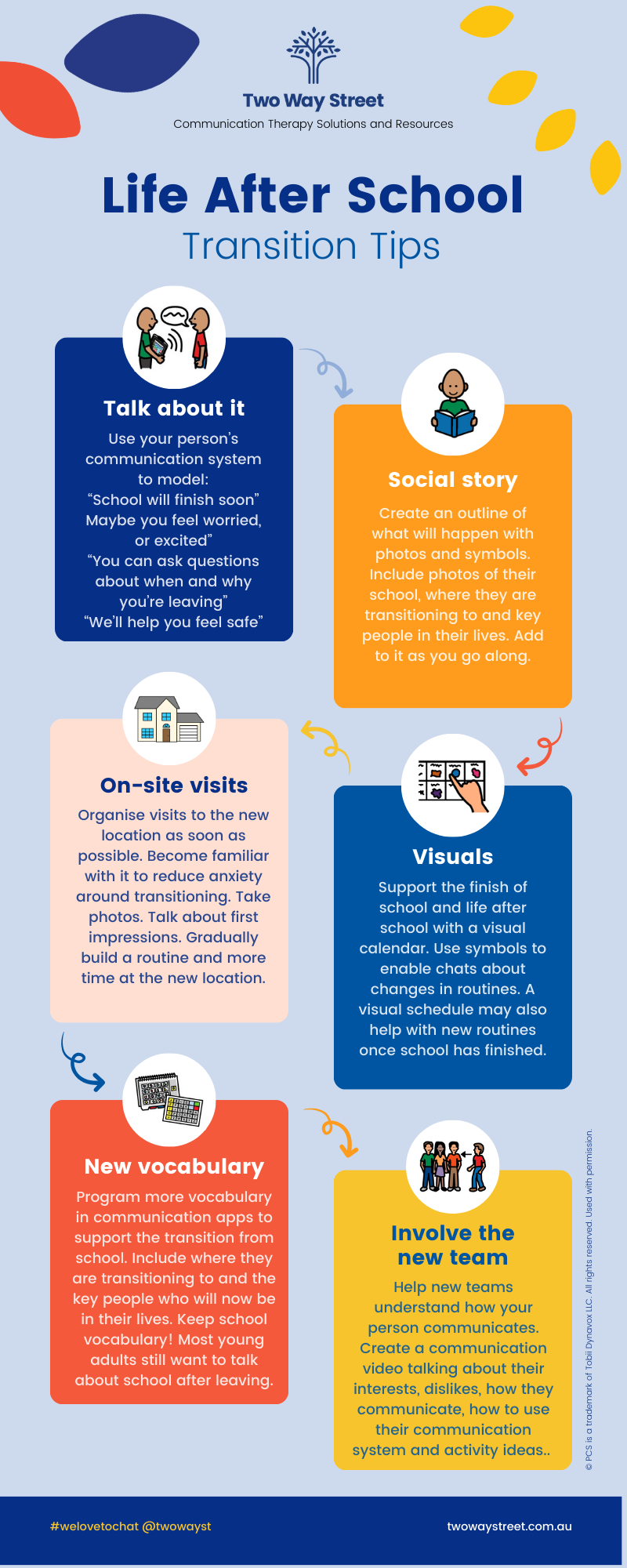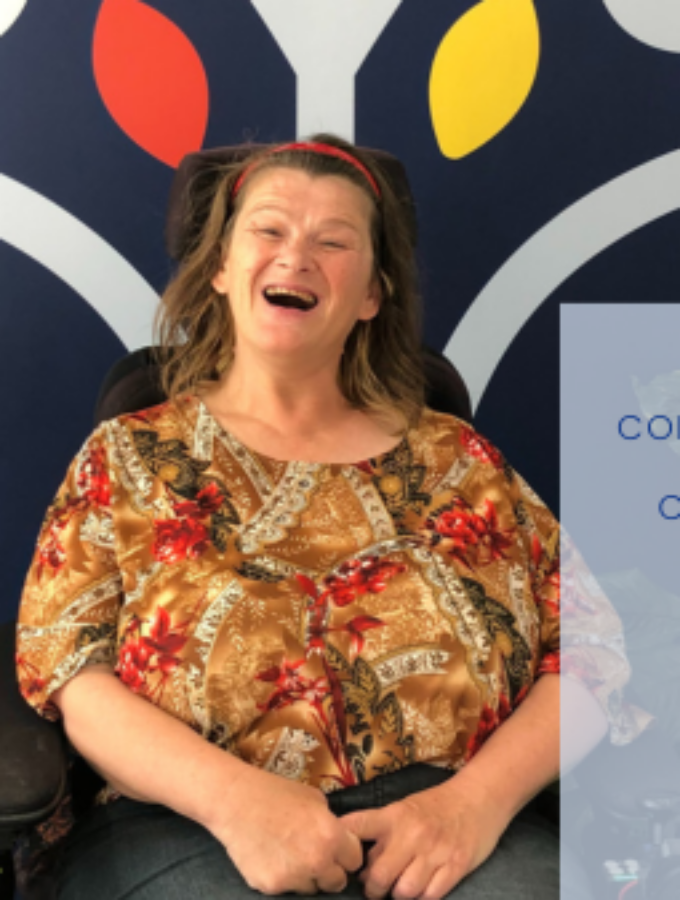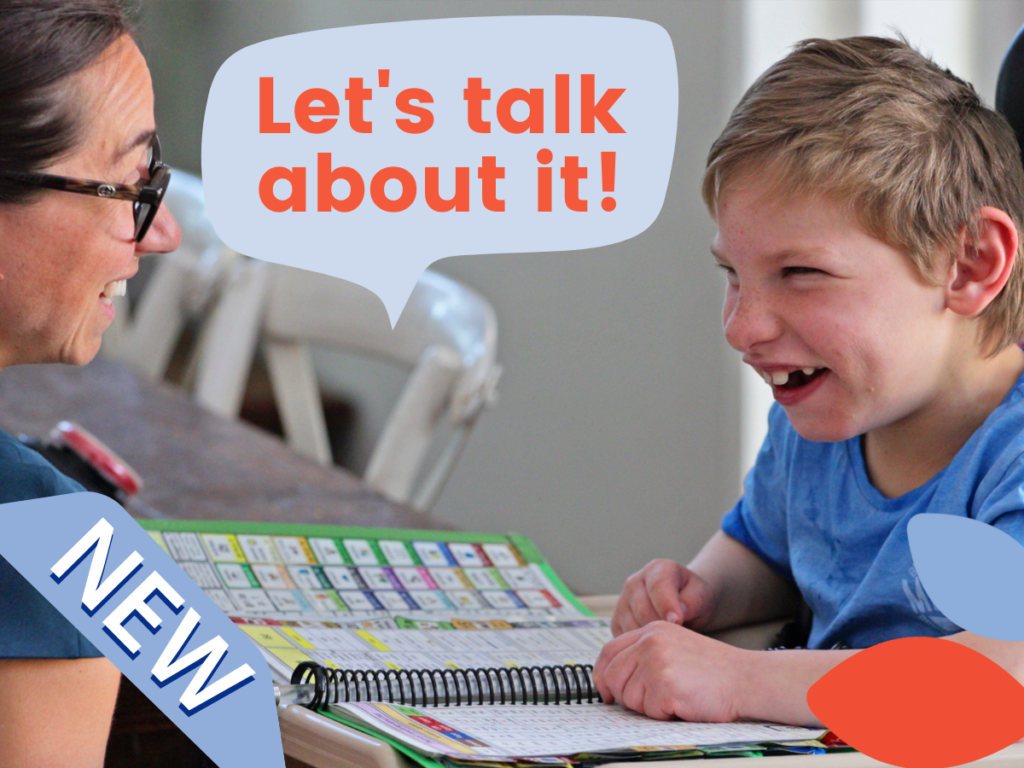Your cart is currently empty!

Most of us spend well over a decade of our younger lives at school. The transition from school to work, school to university – or to whatever life after school looks like – can be a tough one! And it becomes even more complex when you have a communication disability.
In this insight article, we share some strategies and ideas for you to help prepare your person to begin their new life after school, and be ready for whatever the future brings.
You don’t need to prepare anything for this, just talk as you normally would. If possible, use your person’s communication system to model the messages. Here are some ideas:
Create a story using Microsoft Word or the Pictello App outlining what will happen. Use photos and symbols. It’s ok if you don’t have all of the answers when you first introduce the story, you can add to it as you go along. Try to include photos of the school, your person and the key people in their lives. If you know where your person is transitioning to, whether it be further education, work or something else, start introducing this.
When you know where your person will be transitioning to after they finish school, organise some on-site visits as early as possible. It is important that the new setting, whether it is another educational facility, a workplace or somewhere else, becomes a familiar place for your person, to reduce anxiety they may experience about leaving school. Take photos if you can. Ask your person their thoughts about the visits each time they go. Try to gradually work up your days at the new location, so your person has an opportunity to get used to their new routine after school has finished.
A visual calendar is a great way to support the lead up to finishing school and the start of their life after school. This may help you to talk about changes in their routine with symbols. A visual schedule may also help your person with new morning or afternoon routines once school has finished.
Leaving school is a big change, so it is important to give your person access to the vocabulary they need to talk about it. If your person uses a communication app as part of their overall communication, you can program additional vocabulary to support the transition from school. Include the name of the place they are transitioning to once they leave school and the key people that will be in their lives. You could also create a chat page about the transition from school and questions that your person may ask. Be careful not to erase their school vocabulary. Most young adults still want to talk about school after they have left.
If your person is transitioning to a new place such as a workplace or day options program, it is important that their new team understand how they communicate. You, your person and/or your speech pathologist can create a communication video talking about:
These videos are an accessible and engaging way for others to get to know your person.
Once your person leaves school for the final time, find ways to stay connected and enable them to have conversations about their school experiences.
Learning doesn’t stop with school! Your person will have the opportunity to consolidate skills they have learned at school and pick up new skills on their post-school journey. Using these strategies, your person will be better prepared for life after school and empowered to embrace whatever the future holds. This is a new chapter full of possibilities and with your support and the right tools, your person will continue to thrive and grow in their own unique way.
Is your person already a client with Two Way Street? Talk to your Speech Pathologist about creating resources to support the transition from school.
Written by: Erin Morley, Speech Pathologist


I was born with Cerebral Palsy and grew up using my natural speech with what I like to call a ‘Cerebral Palsy accent’ (some of you may call this a communication disability). It was an era when talking freely about emotions just didn’t occur. Limited options for speech generating devices made it difficult for me to communicate effectively, and when I did try to express my feelings, the outcomes were often disastrous for me and those around me.
My parents did their best to create a happy and nurturing home environment. Dinner time was a fabulous time of sharing laughter and conversations, but it would have been immensely valuable if my parents had access to a program like Talking About The Important Stuff to support my emotional development, just as they could with my brother. This would have provided strategies not only to talk about emotions, but to provide children with complex communication needs (CCN) with avenues to express thoughts and feelings, just like any other child. We now recognise the significance of supporting parents and caregivers in this journey as well.
As a child with communication difficulties, my Dad tended to over-protect me, wrapping me in cotton wool as the saying goes! However, I have come to appreciate the wisdom in quotes from people with lived experience of CCN in Talking About The Important Stuff. Quotes like “throw them out of their wheelchair (gently) and let them eat dirt” and “the kid with disability should not be the centre of love all the time”. These quotes serve as powerful reminders that children with CCN deserve to experience everyday life and be exposed to the realities of the world, just like any other child. Over-protection hinders our growth and independence, whereas providing us with opportunities to learn, explore, and be understood promotes our emotional development and self-empowerment.
While it is crucial to start conversations about “the important stuff” during childhood, I am a strong advocate for providing tools and strategies that continue to support individuals with CCN throughout adulthood. Conversations around independence, personal safety, and self-empowerment are long overdue for anyone with a disability, and they hold even greater significance for people with CCN.
Speech Pathologists can work with children and adults with CCN to support them to build on their natural speech. They can also support by introducing Augmentative and Alternative Communication (AAC) as a way to supplement this speech or to give them another way of communicating. AAC systems can take many forms e.g., sign, aided language displays (ALDs), comprehensive communication books (PODD), speech generating devices and many more.
Thinking back to when I was young and having speech therapy, I remember having to listen to the words on a flash card, repeat the words and then sound out each word as I said them. I’m pleased to say, especially during Speech Pathology Week 2023, that nowadays speech therapy looks different. Speechies are much more involved in advocating what works best for their clients and ensuring that all ways that a person communicates are valued. This is important, especially when considering the future “voice” for their individual client. #SPWeek
Through my journey with communication disabilities, I have come to realise the immense power of words in shaping our understanding of one another. By embracing the voices of children with CCN and providing them with the means to express themselves, alongside continued support throughout adulthood, we create opportunities for meaningful connections and a life that flourishes with possibilities.

When you’re little, emotions are big! Think back to when you were young. Did you throw an occasional tantrum? Did you have a bad day and go over it again and again in your head? Until you eventually talked about it with someone you trust and finally felt that huge sense of relief from a problem shared… Probably.
We’ve all had a tough few years and kids have watched their world evolve in ways we could never imagine a short time ago. One of the main messages conveyed when the world was in the turmoil of a pandemic was to ‘stay connected’. We stay connected with one another through sharing stories, ideas, thoughts and even our sense of humour. And we use language to manage our emotions – to tell people how we’re feeling, to validate ourselves, to get help and to regulate ourselves.
So just imagine, you have a million thoughts in your head – some are worries about the future, some are funny stories about your day, some are wondering about what’s happening with your body… but, you need an augmentative communication system like a PODD or communication device, and maybe also a communication partner to share your thoughts clearly. You may not get the same opportunities to talk things through like your siblings or peers.
Emotional development is extremely intertwined with language development. During early years of communication, parents describe their own emotions and the emotions of their child. This ‘emotion talk’ is how we navigate our feelings and start to create our belief systems that stay with us through life. So it’s time to start talking about the important stuff with children with a communication disability, as early as possible, so they too can build a strong foundation for emotional well-being.
Just being aware that emotional development and language development go hand-in-hand is important. Think about all the things that happen in a day that can affect a child emotionally. Create a supportive environment, where you notice when your child may have had strong feelings about something. Celebrate and acknowledge those feelings when you notice them, and do that often! There may not be a response from the child yet, but it’s a great way to ensure they feel heard and can navigate those feelings. And keep talking about stuff in age appropriate ways!
Make vocabulary available. Further to that, model emotional conversations. These conversations may be about something that happened that day or what’s happening in a story you’re reading. You can also scaffold and co-construct messages, to figure out what is happening for your child and help them learn what it means to feel a certain way, how to share their feelings with others and how to indicate why they’re feeling that way.
It is crucial to encourage independent exploration and problem solving from an early age, no matter how a child communicates. Ask children to direct you when appropriate, respect preferences and begin to negotiate. Perhaps you could include your child in interviews with support workers. Any time you find yourself advocating for your child, add those messages to their communication system and show them how to advocate for themselves. Let them hear from people with lived experiences of communication difficulties. Always respect and enable privacy and authorship for anyone using AAC. Do they have the opportunity to talk privately? Can they tell you ‘don’t say that’ or ‘don’t tell anyone’? Can they clarify a message, or say ‘that’s not what I meant’?
By adopting these simple strategies, you can help your little one manage big emotions and navigate their world with confidence and resilience.
To learn more about positive emotional development in children with communication difficulties, take the FREE Two Way Street online course ‘Talking About The Important Stuff’. The course gives parents and key communication partners the skills and knowledge they need to enable meaningful conversations with their kids.

